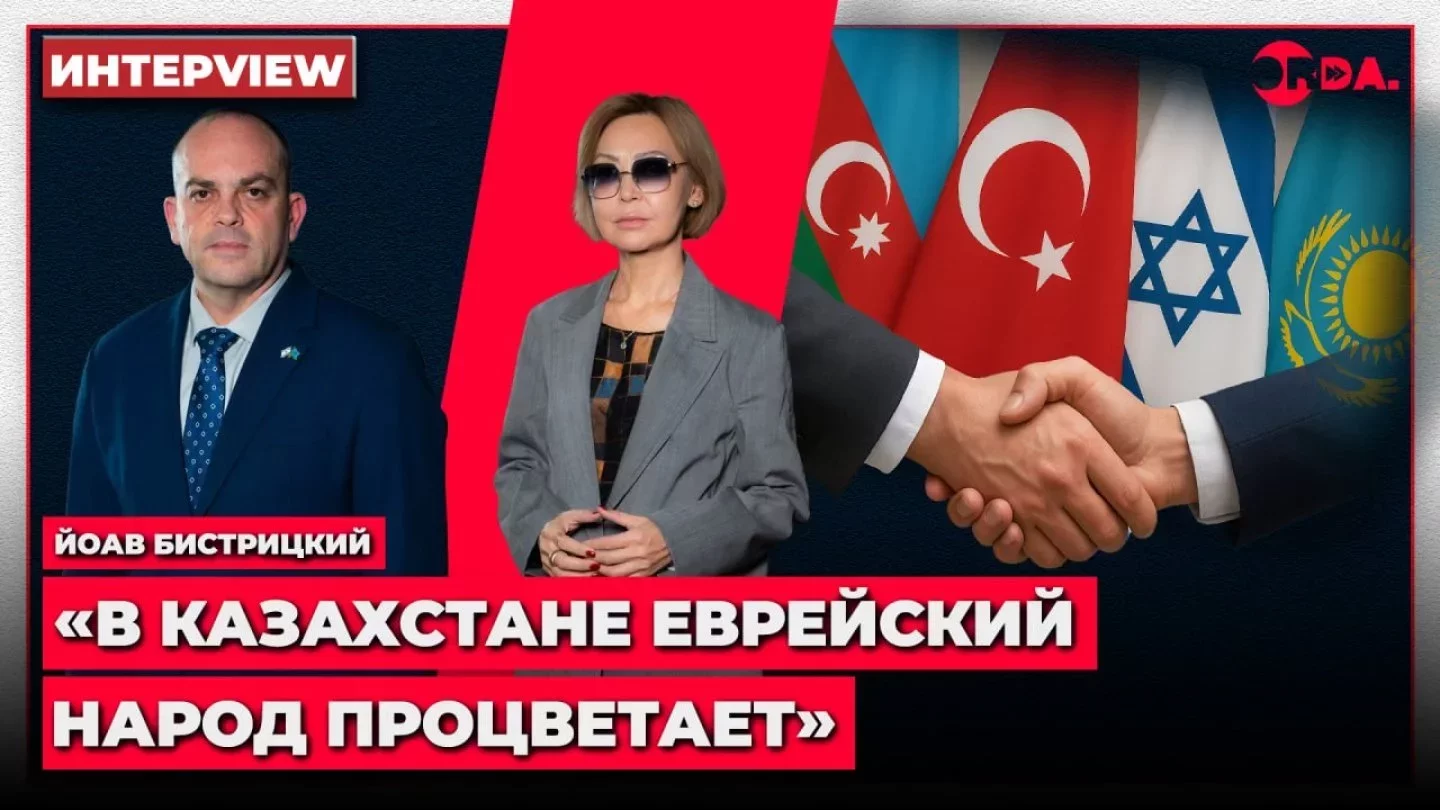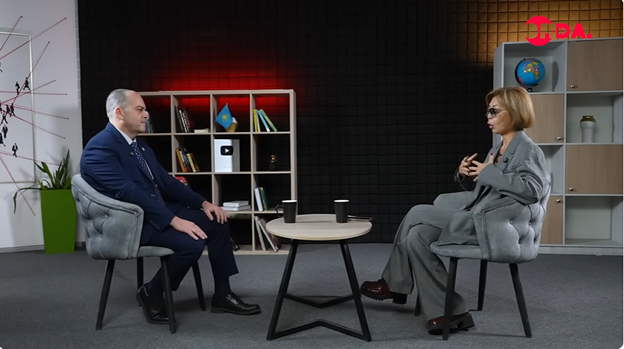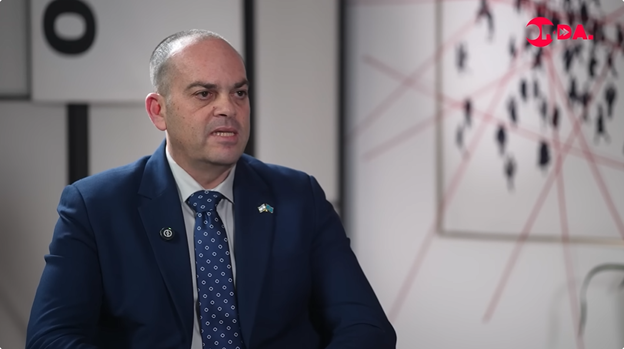Interview With the Israeli Ambassador: Key Issues and Perspectives
 Photo: Orda.kz
Photo: Orda.kz
After President Qasym-Jomart Toqayev’s visit to the United States, where Kazakhstan announced its intention to join the Abraham Accords, the topic of signing the document has generated wide interest.
Why is this decision important, what prospects does it open for our country, and how do people in Israel and across the world see the development of relations — Israeli Ambassador to Kazakhstan and Kyrgyzstan Mr. Yoav Bistritsky explained in an exclusive interview for Orda NEWS.
Yoav Bistritsky is the Ambassador of the State of Israel to Kazakhstan and Kyrgyzstan. He served as Deputy Ambassador of Israel to Azerbaijan and Ukraine. Before joining the diplomatic service in 2019, Mr. Bistritsky served for more than 20 years in the Israel Defense Forces and worked at the Ministry of Defense, holding leadership positions in international relations, strategic planning, and operational development.
The Abraham Accords — Kazakhstan’s Role
According to Mr. Bistritsky, the Abraham Accords are not just a diplomatic document but a whole platform for economic and cultural interaction.
They were signed five years ago with those states that did not have diplomatic relations with Israel. The United States is overseeing this topic, and of course, all countries can gain some positive opportunities from it, he emphasized.
Israel and Kazakhstan, Mr. Bistritsky reminded, have maintained diplomatic relations for more than 30 years. However, the ambassador is confident that participation in the Abraham Accords creates a new foundation for deepening them:
We are always happy and interested in strengthening and expanding our relations with friendly countries, especially with Kazakhstan.
Yoav Bistritsky also noted the positive attitude of our country toward Israel.
You have a friendly people, we are friends not only between states but also between nations. There are many people in Israel who come from Kazakhstan, and here we see an opportunity to strengthen our relations.
Diplomatic Balance and Kazakhstan’s Regional Role
Speaking about mutual cooperation with our country, the ambassador spoke about the special relations with Azerbaijan, whose history spans thousands of years.
There are more than 75,000 people from Azerbaijan living in Israel. And in Azerbaijan there is even a Jewish settlement, Guba, Krasnaya Sloboda (Quba, Qırmızı Qəsəbə – Ed.), which is considered the largest Jewish population outside of Israel.
Looking ahead, the diplomat sees Kazakhstan as a country capable of uniting the interests of East and West.
Kazakhstan, like Azerbaijan, are both peaceful countries that try to maintain good relations with all the states that surround them. Kazakhstan can become in Central Asia what Azerbaijan is for us in the South Caucasus.
In the ambassador’s view, Kazakhstan’s multi-vector policy does not cause concern in Israel.
Mr. Bistritsky noted that for Israel, Kazakhstan’s experience in maintaining balance between major powers and its neighbors is an illustrative example of diplomatic flexibility. According to him, Israel sees this not as a contradiction but as a valuable quality.
By the way, in Israel we also try to be friends with our neighbors. In 1979 we signed a peace agreement with Egypt, in 1994 with Jordan, and we hope that in the future we will be able to reach such an agreement with Syria, perhaps even with Lebanon, as well as with other countries. So we are trying to live peacefully.
The diplomat also emphasized that the Jewish diaspora in Kazakhstan is flourishing, and that there are many opportunities for them for development and life, and Israel sees Kazakhstan not just as a partner but as a country capable of becoming a regional bridge between East and West.

The Abraham Accords as a Precedent
In 2020, the first Abraham Accords with Israel were signed by the United Arab Emirates, Bahrain, Sudan, and Morocco. The countries officially recognized Israel, beginning negotiations on cooperation in various fields.
The signing of the document opened many opportunities.
Without trust, we cannot achieve anything. By signing the Abraham Accords, the countries mutually understood — now we can do something together, and trust is the most important thing here, the ambassador said.
Hamas Must Leave Gaza.
Recalling October 7, 2023, when the terrorist organization Hamas kidnapped more than 250 people during an attack on Israel, Yoav Bistritsky said that after the signing of the agreement, part of the hostages were released.
Now, the bodies of four hostages still have not been returned to their homeland.
We have hope for peace, but unfortunately reality shows us something different.
Mr. Bistritsky stated that despite certain agreements and signed documents, Hamas remains in Gaza. The diplomat believes that countries must jointly adopt a strategic approach to achieving a ceasefire because such a situation cannot continue.
Hamas must leave Gaza, lay down its weapons. We hope that some kind of international force will enter Gaza and restore order there, but we cannot live together with Hamas, he concluded.
Türkiye and a Pro-Palestinian Approach
Israel’s relations with Türkiye have a chance for a new stage. Such a conclusion was made by Mr. Bistritsky, who said that before the war in 2023, the countries had a large trade turnover, tourist flow, and the Turkish airline operated more than a dozen flights a day to Israel’s international airports.
The ambassador believes that the basis for good relations exists, and the Israeli side hopes for peaceful normalization of relations. He expressed hope that with the help of Donald Trump and the American administration, the two countries may have a chance for a new start.
Now Türkiye has decided to take a very pro-Palestinian approach, they can, of course, act as they want. And ignoring this is impossible.
The Russia-Ukraine War
Discussing the war between Russia and Ukraine, the ambassador noted that Israel has diplomatic relations with both countries, where large Jewish communities now live.
At one time, Israel attempted to play a mediating role in resolving the conflict.
We hope that there will be some kind of truce.
Economy, Technology, and Water
The main focus, according to the ambassador, is economic cooperation.
We believe that we will be able to attract new investments to Kazakhstan and Israel from the United States and give some new opportunities to the United States, Israel, and Kazakhstan.
Israel is ready to share its expertise in high technologies, agriculture, and water resource management.
In Israel, we already have seven water desalination plants today. Nearly 80 percent of our water is desalinated. We would like to work with Kazakhstan, and there are already large-scale projects that we are beginning to implement.

AI and The Digital Economy
The conversation turned to technology, where the interest proved mutual. Kazakhstan is actively developing digital infrastructure and artificial intelligence — areas close to Israel.
We were very glad to hear that Mr. Toqayev said a new Digital AI Ministry had been created in Kazakhstan. I think this is a very good step forward, the diplomat noted.
At the same time he added: Kazakhstan is already demonstrating a high level of technological development:
I would say the level of digital services in Kazakhstan is very high. Sometimes even higher than what we see in Israel.
Education and Human Capital
Israel is also focusing on educational cooperation.
Mr. Bistritsky spoke about the work of the MASHAV agency under the Israeli Foreign Ministry, through which thousands of Kazakhstanis have undergone training in recent years.
Thousands of MASHAV graduates are also Kazakhstanis who over the past 10–15 years have traveled to Israel to study.
He emphasized that the training is conducted in Russian to make the programs as accessible as possible.
We are ready to provide similar courses in the future. And we are always glad to see MASHAV graduates from Kazakhstan.
Tourism, Visas, and Direct Flights
A key topic was the restoration of direct flights between Almaty and Tel Aviv, which previously existed. This is not just a matter of convenience but an important element in building trust and exchange between the countries.
We issue about 30 visas a month, maybe even more, for your citizens who travel to Israel for medical treatment, tourism, or to visit relatives. When the direct flight is restored, the flow of people between Kazakhstan and Israel will increase significantly.
As for the visa regime, the diplomat acknowledged that Kazakhstan has expressed interest in its liberalization.
We know that Kazakhstan has such a wish, we hear it. Perhaps even the Abraham Accords may also influence our approach to this issue.
Kazakhstan as a Partner of The Future
Concluding the conversation, the Israeli ambassador emphasized that his country is interested in long-term and peaceful cooperation. According to him, Kazakhstan’s participation in the Abraham Accords may become an example for other states in the region.
We want peace, we love peace, we want to live peacefully. Our children want to live peacefully, our families want to live peacefully, he said.
Mr. Bistritsky summarized: Israel views the Abraham Accords not only as a political tool but as a path to creating a sustainable network of mutual understanding between peoples.
For Kazakhstan, which traditionally builds its foreign policy on the principles of peace and diplomacy, participation in this process may become a new point of growth — from technology to education, from water to science.
Original Author: Valeria Korchagina
Latest news
- The Delivery of 51 Stadler Passenger Coaches Has Been Delayed
- Kazakhstan Returns Nearly 1,000 Citizens From the Middle East
- Damaged Baikonur Launch Pad Facility Restored After 2025 Collapse
- A Rare Black Melanist Wolf Was Shot in Eastern Kazakhstan
- Kazakhstan Maintains Neutral Stance on Middle East Escalation
- Kazakh MFA: Citizens Evacuated from the Middle East via Oman and Saudi Arabia
- Kazakhstan to Spend 4.6 Trillion Tenge on Road Projects Through 2029
- Central Asia Competes for the Skies: Why Kazakhstan Risks Falling Behind Uzbekistan on Jet Fuel
- The War in Iran Opens a Window of Opportunity for Kazakhstan’s Oil Sector, Analysts Say
- Iran Conflict Escalates Beyond the Gulf: What Kazakh Experts Say About Risks for Central Asia and Kazakhstan
- Kazakhstan Prepares Possible Evacuation of Its Citizens From Iran
- LRT in Astana Is Reaching the Finish Line: The Launch Is Expected in the Coming Months
- Kazakhstan Ready to Help the UAE Amid Escalation in the Region
- Tokayev Discusses Middle East Escalation With Qatar’s Emir
- Airlines Ready to Bring Kazakhstanis Home From the Middle East
- Tokayev Sends Support Messages to Gulf Leaders Amid Regional Escalation
- Kazakhstan Bans Its Airlines From Flying Over Several Middle East Countries
- Astana Strengthens Security Measures Amid Escalation Around Iran
- Tokayev Meets U.S. Ambassador Stufft, Discusses Board of Peace Cooperation
- Mangystau Launches AI-Assisted School Monitoring to Prevent Teen Suicidal Behavior

